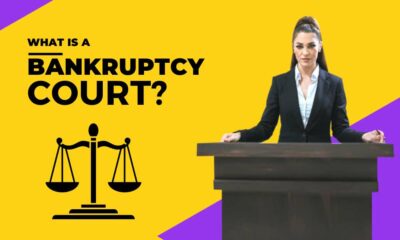Financial advice
What is the Downside of Filing for Bankruptcy?

What is the Downside of Filing for Bankruptcy?
What is the downside of filing for bankruptcy? First, let’s discuss the basics. When you file for bankruptcy, you are essentially discharging your debts through the legal process of filing for bankruptcy. By discharging your debts through the federal court, you can acquire a clear financial slate and start over. It is your decision to choose the option of filing for bankruptcy when it is excessive or when payback becomes unattainable.
What are some of the disadvantages of declaring bankruptcy?
Filing for bankruptcy allows a person to dismiss their debts and start over financially. The choice to declare bankruptcy carries the possibility of being forced to give up some or all of your assets that are not legally protected from creditors.
If you’re considering bankruptcy, ask yourself if you want to keep any assets. If no such assets are found, you can file for Chapter 7 bankruptcy and keep your home and car.
What Happens to Your Credit Score If You File Bankruptcy?
A person or company can be declared legally bankrupt through a process known as bankruptcy. This can apply to both individuals and corporations. They would then be able to begin the process of re-establishing their credit score by formulating a payment strategy after making this declaration.
Most people find the process of declaring bankruptcy to be tough and complex, but it is critical to understand how declaring bankruptcy can influence your credit score. A bankruptcy will remain on your credit report for seven to ten years, having a significant impact on your credit score.
How Long Does It Take to Rebuild Credit After Filing for Bankruptcy?
It is widely accepted that declaring bankruptcy is one of the most effective ways to discharge one’s financial commitments. Regrettably, this will also have a negative impact on your credit score.
If you want to repair your credit after filing for bankruptcy, there are a few things you should consider. One of these is the amount of time required before your credit score may fully recover from the effects of filing for bankruptcy.
Which steps can I take to help me finish this task faster?
There are a few things you may do after declaring bankruptcy to speed up the process of reestablishing your credit. Taking advantage of any opportunity to pay off any outstanding debts is one of these steps. These are as follows:
- Maintaining regular monthly payments on all of your debts, including any invoices assigned to a trustee or attorney during the bankruptcy process.
- Examining your credit history guarantees that nothing there will have a negative impact on your score in the future.
- Consider saving more. This is in case you decide to make any large purchases in the future. For example, it is a good idea to have some money set aside in case of an emergency.
What Are the Potentially Negative Consequences of Filing for Bankruptcy?
Declaring bankruptcy can have a number of negative implications, including the following:
- The debtor will be denied access to the great majority of credit possibilities. Due to their terrible credit history, they will not be able to obtain a new mortgage, auto loan, or even a credit card. In most cases, the debtor will be ineligible for government financial assistance, whether to further their education or acquire a home. Furthermore, there is a chance that they will lose their eligibility for welfare and food stamps.
- The debtor’s wages may be garnished as a result of the bankruptcy that is now on their record, and they may have difficulties obtaining jobs in the future. Furthermore, the debtor may experience increasing job rivalry. If the debtor does not qualify for any of the exemptions allowed by bankruptcy law, they risk losing all of their personal property.
What are the potential disadvantages or risks of declaring bankruptcy?
The most important risk of declaring bankruptcy is that it will have a negative influence on your present credit score. As a result, obtaining loans or mortgages will become more difficult in the future. When you file for bankruptcy, there is a chance that you will not be able to discharge all of your debts. This, of course, is dependent on the sort of bankruptcy you apply for.
-

 Credit Score3 years ago
Credit Score3 years agoWhy Do Credit Scores Drop After Acquiring a New Credit Card?
-

 Credit Repair2 years ago
Credit Repair2 years agoHow to Remove Credit Inquiries from Credit Report
-

 Financial advice2 years ago
Financial advice2 years agoHow to Break a Lease Without Ruining Your Credit
-

 Credit Repair2 years ago
Credit Repair2 years agoHow to Fix an Eviction on My Credit Report
-

 Financial advice3 years ago
Financial advice3 years agoGetting Pre-Approved for a Home Loan-The Ins and Outs
-

 Credit Repair2 years ago
Credit Repair2 years agoSmart Credit Repair After Divorce
-

 Financial Services2 years ago
Financial Services2 years agoWhat Can You Expect in a Bankruptcy Court?
-

 Financial advice3 years ago
Financial advice3 years agoThe Pros and Cons of Buy Now Pay Later Deals











